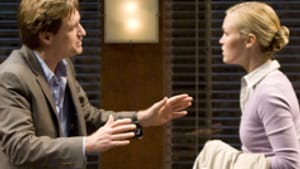Stay in the Loop
BSR publishes on a weekly schedule, with an email newsletter every Wednesday and Thursday morning. There’s no paywall, and subscribing is always free.
Hubris on the loose, again
Mamet's "Oleanna' revived in New York

I can't forget the 1992 premiere of Oleanna, David Mamet's stunning two-person sexual harassment drama (with Mamet directing William Macey and Rebecca Pidgeon). The venue was Off-Broadway, on a Saturday night with an audience one could assume to be sophisticated, acute and civilized. But everyone in the house was in full battle gear in that post-Anita Hill era of gender politics; among other shockers, somebody yelled out to the stage, "Hit the bitch." All of us left spitting mad, knowing we'd seen a work of major theater.
Still aggravating, still shocking, still engrossing after all these years, Oleanna is receiving a fierce and fine revival on Broadway starring Bill Pullman and Julia Stiles.
For me, this play about a male professor and his female student is a lose/lose proposition. As a career academic, I find John's "side" (and this is a play about taking sides) sometimes sympathetic, sometimes repulsive. As a woman, with vivid recollections of the bad old days, I find Carol's "side" sometimes sympathetic, sometimes repulsive. This is sociopolitical, psychosexual dialectic honed to a razor-sharp edge.
The preoccupied professor
In Mamet's scenario, John's course in theories of education has confused and discouraged Carol. She comes to him for help with the material and his response is both preoccupied (he's on the phone with his real estate agent about a problem with the house he hopes to buy) and willing to help (he offers to abandon the tyranny of a grade if she comes for tutorial sessions) and patronizing (his vocabulary is jargonized and pretentious).
The tenure committee has voted "yes" to his application but it's not yet official. Uh, oh. The professor is very tense: Pullman's John is so tightly wound you half expect his fingers to twang as he gestures in the air; it's a performance of thrilling subtlety and ambiguity.
Carol, in turn, is exasperatingly dense: She resorts to tears, creating a pitiable, self-demeaning defensive posture (Stiles is so thin, so vulnerable and sits folded up, arms folded across her body) as her seemingly willfully irrational arguments infuriate John (and us). But her questions are substantial: By teaching a course about the uselessness and fraudulence of college courses, isn't John just exploiting his contempt for his profession? (He had written a book called Empty Ritual.)
A struggle over talk
Somewhere between Act I and Act II, Carol has been taken up by a women's consciousness group, as a result of which she has filed a combative sexual harassment suit. Both Pullman and Stiles inhabit these characters so completely and intensely that their struggle between male and female, powerful and powerless, ideal and ideal amounts to witnessing a political revolution as well as a tragedy. Hubris is on the loose again, on both sides.
The issue isn't only who intended what, but who said what and who understood that what to mean what. Carol's literalism and incapacity to understand the nuances of language create some of the mayhem, but John's frustration at his inability to convince her— through language— of his good and noble intentions (what a pompous ass he is!) mean that this play, like all Mamet plays, is about talking.
The Venetian blinds descend
The set (designed by Neil Patel) begins this production; the stage is a ridiculously large academic office— wide, high and handsome, with huge windows revealing a charming college campus beyond. Then a weird electronic musical buzz begins and metallic Venetian blinds slowly descend in unison, covering the windows, sealing the office. This will occur— blind raised, then lowered with buzz—three times, dividing the three short acts (the play has no intermission).
Act I ends with this exchange about an forthcoming party:
John: There are those who would say it's a form of aggression.
Carol: What is?
John: A surprise.
If you want surprise and aggression, stick around for Act III. Under Doug Hughes's direction and Rick Sordelet's superb fight choreography, Oleanna still shoves us out of the theater into the street and into our lives, provoked if not enlightened. But it's a good bet you'll be mad, and another good bet you'll be convinced you've seen great theater.
Still aggravating, still shocking, still engrossing after all these years, Oleanna is receiving a fierce and fine revival on Broadway starring Bill Pullman and Julia Stiles.
For me, this play about a male professor and his female student is a lose/lose proposition. As a career academic, I find John's "side" (and this is a play about taking sides) sometimes sympathetic, sometimes repulsive. As a woman, with vivid recollections of the bad old days, I find Carol's "side" sometimes sympathetic, sometimes repulsive. This is sociopolitical, psychosexual dialectic honed to a razor-sharp edge.
The preoccupied professor
In Mamet's scenario, John's course in theories of education has confused and discouraged Carol. She comes to him for help with the material and his response is both preoccupied (he's on the phone with his real estate agent about a problem with the house he hopes to buy) and willing to help (he offers to abandon the tyranny of a grade if she comes for tutorial sessions) and patronizing (his vocabulary is jargonized and pretentious).
The tenure committee has voted "yes" to his application but it's not yet official. Uh, oh. The professor is very tense: Pullman's John is so tightly wound you half expect his fingers to twang as he gestures in the air; it's a performance of thrilling subtlety and ambiguity.
Carol, in turn, is exasperatingly dense: She resorts to tears, creating a pitiable, self-demeaning defensive posture (Stiles is so thin, so vulnerable and sits folded up, arms folded across her body) as her seemingly willfully irrational arguments infuriate John (and us). But her questions are substantial: By teaching a course about the uselessness and fraudulence of college courses, isn't John just exploiting his contempt for his profession? (He had written a book called Empty Ritual.)
A struggle over talk
Somewhere between Act I and Act II, Carol has been taken up by a women's consciousness group, as a result of which she has filed a combative sexual harassment suit. Both Pullman and Stiles inhabit these characters so completely and intensely that their struggle between male and female, powerful and powerless, ideal and ideal amounts to witnessing a political revolution as well as a tragedy. Hubris is on the loose again, on both sides.
The issue isn't only who intended what, but who said what and who understood that what to mean what. Carol's literalism and incapacity to understand the nuances of language create some of the mayhem, but John's frustration at his inability to convince her— through language— of his good and noble intentions (what a pompous ass he is!) mean that this play, like all Mamet plays, is about talking.
The Venetian blinds descend
The set (designed by Neil Patel) begins this production; the stage is a ridiculously large academic office— wide, high and handsome, with huge windows revealing a charming college campus beyond. Then a weird electronic musical buzz begins and metallic Venetian blinds slowly descend in unison, covering the windows, sealing the office. This will occur— blind raised, then lowered with buzz—three times, dividing the three short acts (the play has no intermission).
Act I ends with this exchange about an forthcoming party:
John: There are those who would say it's a form of aggression.
Carol: What is?
John: A surprise.
If you want surprise and aggression, stick around for Act III. Under Doug Hughes's direction and Rick Sordelet's superb fight choreography, Oleanna still shoves us out of the theater into the street and into our lives, provoked if not enlightened. But it's a good bet you'll be mad, and another good bet you'll be convinced you've seen great theater.
What, When, Where
Oleanna. By David Mamet; directed by Doug Hughes. At John Golden Theatre, 252 West 45th St., New York. (212) 239-6200 or www.playbill.com.
Sign up for our newsletter
All of the week's new articles, all in one place. Sign up for the free weekly BSR newsletters, and don't miss a conversation.

 Toby Zinman
Toby Zinman